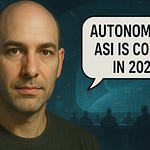🥈Heavy Silver
My novel HEAVY SILVER is out! You can read more about it and watch BOTH trailers here:
https://www.heavysilver.net/
🧭 New Era Pathfinders
Check out my growth community for navigating the Fourth Industrial Revolution! The New Era Pathfinders is a group of people looking to find meaning and build a career in the next wave. I am now teaching FOUR frameworks for adaptation!
https://www.skool.com/newerapathfinders/about
TLC - Therapeutic Lifestyle Changes for a balanced, happy, and healthy lifestyle.
PBL - Project Based Learning to master any skill or technology
Systems Thinking - To approach problems like I do, and other geniuses like Mark Zuckerberg and Elon Musk
RUPA - My proprietary framework specifically for pivoting into the 4IR and Meaning Economy. It means “Reduce worry, Understand impact, Prepare for changes, Adapt and align”
📚 Recommended Reading
Grace Blakely's book "Vulture Capitalism" offers an accessible yet dense analysis of modern economic systems. The speaker recommends this book alongside other influential economic texts that have shaped their understanding. These sources provide context for the ideas presented and demonstrate that the concepts are grounded in research rather than speculation.
🌐 Understanding Neoliberalism
Neoliberalism has been the dominant global economic paradigm for over 40 years, becoming the de facto policy of major international institutions. Originating with Ronald Reagan and Margaret Thatcher in 1980, neoliberalism emphasizes free market capitalism, privatization, globalization, fiscal austerity, and individual responsibility. The cyberpunk genre emerged as a reaction to neoliberalism, depicting the "high tech, low life" outcomes many associate with late-stage capitalism. While initially innovative, neoliberalism has led to power concentration, lower social mobility, wage stagnation, and a squeezed middle class.
🤖 The Rise of Artificial Intelligence
As AI and robotics become better, faster, cheaper, and safer than humans at most economically meaningful activities, replacing human labor becomes economically inevitable. The speaker gives an example of AI-generated art outperforming and being more cost-effective than human artists. This trend is expected to continue across industries, potentially including critical services like surgery. The assumption that technology always creates new jobs for humans may not hold true in an AI-driven future.
💼 Post-Labor Economics
Post-labor economics emerges as a framework to address the challenges posed by AI and automation. Key observations include the devaluation of human labor, the upending of the current social contract based on private ownership and labor rights, and the need for a new economic paradigm. The speaker argues that relying solely on Universal Basic Income (UBI) is insufficient, as it could lead to over-dependence on government and reduce individual economic agency.
🤝 Collective Ownership
Post-labor economics proposes favoring collective ownership over private ownership. This involves developing regulatory frameworks and technologies that support collective ownership models. Examples of resources suitable for collective ownership include farms, data centers, power plants, and high-density urban areas. The speaker suggests using blockchain technology to enable true collective ownership, coining the phrase "seize the means of production and put it on a blockchain."
🌿 Decentralization
Decentralization of power in economic, governmental, and social systems is a key principle of post-labor economics. Technologies like the internet, cryptocurrency, and blockchain enable this decentralization. The goal is to counteract the concentration of power in corporations and put decision-making back in the hands of individuals. This principle aims to address issues like the military-industrial complex and the outsized influence of corporations on government policy.
🔍 Transparent Governance
Post-labor economics calls for more transparent and accountable government systems. The current political system, with its roots in agrarian society, is seen as outdated and vulnerable to corruption. Blockchain technology could potentially increase transparency in government operations and decision-making. This principle aims to curb both government overreach and corporate influence in politics.
🗳️ Consensus-Based Decision Making
The framework proposes moving beyond representative democracy to more direct, consensus-based decision-making systems. Advanced technologies like AI, blockchain, and moral graphs can enable more sophisticated methods of reaching consensus and surfacing true public values. This approach aims to better align governance with the will and best interests of the people, while reducing the influence of special interest groups.
🛠️ Enabling Technologies
Post-labor economics relies on three primary enabling technologies: blockchain, AI, and Decentralized Autonomous Organizations (DAOs). Blockchain provides immutable and verifiable public ledgers. AI is expected to assist in management and decision-making, potentially outperforming human leaders. DAOs offer a new model for organizational governance that could be applied at various levels, from local communities to national governments.
🏛️ Subsidiarity and Implementation
The principle of subsidiarity, already in use in some countries, aligns with post-labor economics by favoring decision-making at the lowest capable level. The transition to this new economic model should be gradual to avoid disruptions. Challenges include balancing private and collective ownership, adapting regulatory frameworks, and addressing privacy concerns in a more transparent system. The speaker encourages voting for politicians who support blockchain and decentralized technologies to facilitate this transition.













Share this post